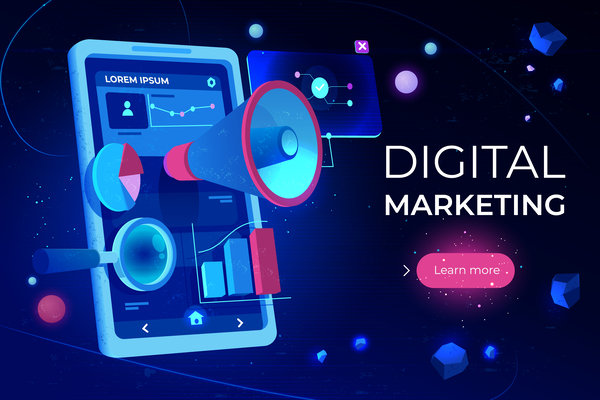In today’s hyper-connected world, where consumers are constantly bombarded with information, traditional marketing methods are no longer sufficient to capture and retain their attention. Enter digital marketing – a dynamic and ever-evolving landscape that has revolutionized the way businesses reach and engage their target audience. From small startups to multinational corporations, leveraging the power of digital marketing has become essential for success in the modern business landscape.
Understanding Digital Marketing:

Digital marketing encompasses a broad range of online tactics and channels aimed at promoting products or services, building brand awareness, and driving customer engagement. Unlike traditional marketing, which relies heavily on print ads, TV commercials, and billboards, digital marketing leverages the internet and digital technologies to connect with consumers in a more personalized and targeted manner.
Key Components of Digital Marketing:
- Search Engine Optimization (SEO): SEO is the process of optimizing a website’s content and structure to improve its visibility and ranking on search engine results pages (SERPs). By implementing SEO best practices, businesses can increase organic traffic to their website and enhance their online presence.
- Content Marketing: Content marketing involves creating and distributing valuable, relevant, and consistent content to attract and retain a clearly defined audience. This can include blog posts, articles, videos, infographics, and social media posts. Effective content marketing establishes credibility, drives website traffic, and nurtures customer relationships.
- Social Media Marketing: Social media platforms have become integral to digital marketing strategies, providing businesses with the opportunity to connect with their audience on a more personal level. Through targeted advertising, engaging content, and community management, businesses can build brand awareness, foster customer loyalty, and drive conversions.
- Email Marketing: Despite the rise of social media and other digital channels, email marketing remains a powerful tool for businesses to communicate directly with their audience. By delivering personalized messages, promotions, and updates, email marketing can drive engagement, nurture leads, and generate sales.
- Pay-Per-Click (PPC) Advertising: PPC advertising allows businesses to bid for ad placement on search engines and other digital platforms. By targeting specific keywords and demographics, businesses can reach potential customers at the precise moment they are searching for relevant products or services. PPC campaigns can drive targeted traffic to a website and generate immediate results.
The Advantages of Digital Marketing:

- Targeted Audience Reach: Digital marketing enables businesses to target their audience with precision, based on demographics, interests, behavior, and other factors. This targeted approach ensures that marketing efforts are directed towards those most likely to be interested in the product or service, maximizing ROI.
- Measurable Results: Unlike traditional marketing methods, digital marketing offers robust analytics and tracking tools that allow businesses to measure the performance of their campaigns in real-time. From website traffic and engagement metrics to conversion rates and customer acquisition costs, businesses can gain valuable insights into the effectiveness of their marketing efforts and make data-driven decisions.
- Cost-Effectiveness: Digital marketing can be more cost-effective than traditional marketing channels, particularly for small businesses with limited budgets. With options like social media advertising and email marketing, businesses can reach a large audience at a fraction of the cost of traditional advertising methods.
- Increased Brand Visibility: With billions of people active on social media platforms and search engines every day, digital marketing offers businesses unparalleled opportunities to increase brand visibility and exposure. By maintaining a strong online presence and engaging with their audience across multiple channels, businesses can ensure that their brand remains top-of-mind among consumers.
Adapting to the Digital Landscape:
To thrive in the modern business landscape, businesses must adapt to the ever-changing digital landscape and embrace innovative marketing strategies. This requires staying abreast of emerging trends and technologies, understanding the needs and preferences of their target audience, and continually refining their digital marketing efforts to deliver maximum impact.
Ready to Embrace Digital Marketing?
In conclusion, the power of digital marketing in the modern business landscape cannot be overstated. From enhancing brand visibility and driving customer engagement to generating leads and increasing sales, digital marketing offers businesses a wealth of opportunities to succeed in today’s competitive market. By harnessing the full potential of digital marketing channels and strategies, businesses can unlock new growth opportunities and achieve long-term success in the digital age.









Hi i think that i saw you visited my web site thus i came to Return the favore I am attempting to find things to improve my web siteI suppose its ok to use some of your ideas